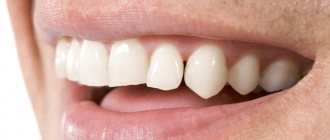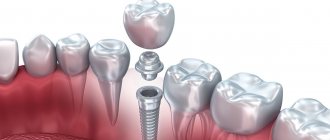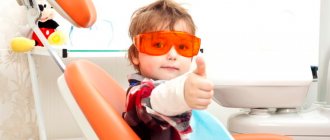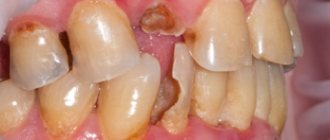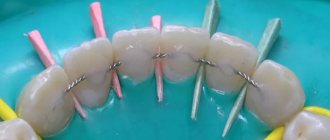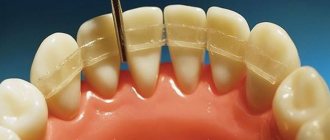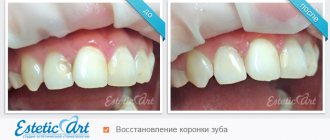Dental implantation for periodontal disease: before and after photos
More
details
More details
More details
More details
More details
Implant-supported prosthetics
| Metal-free implant crown made of zirconium dioxide with screw fixation Nobel Procera Zirconia (USA) | Make an appointment | from 40,000 rub. |
| Metal-free all-ceramic Imax or zirconium dioxide implant crown with cement fixation on an individual titanium, zirconium or CoCr abutment | Make an appointment | from 35,000 rub. |
| Temporary crown on an implant with screw or cement fixation (Lemberg-Dental GmbH) | Make an appointment | from 10,000 rub. |
Removable prosthetics supported by implants
| Dental prosthetics with complete removable plate dentures (1 jaw) supported by implants on 4 locators | Make an appointment | 70,000 rub. |
| Cost of 1 locator as part of a removable denture | Make an appointment | 15,000 rub. |
| Dental prosthetics with complete removable plate dentures (1 jaw) supported by implants on 4 ball-shaped abutments | Make an appointment | 130,000 rub. |
Other orthopedic services
| Removal of a fixed orthopedic structure from an implant | Make an appointment | 1000 rub. |
| Removal of a fixed orthopedic structure from the implant with removal of the damaged screw from the shaft | Make an appointment | 7000 rub. |
Implantation (surgical part)
| Intraosseous dental implantation | Make an appointment | 40,000 rub. |
| Intraosseous dental implantation of the Nobel Biocare system (Sweden) for further dental prosthetics | Make an appointment | 55,000 rub. |
| Intraosseous dental implantation of the INNO system (South Korea) | Make an appointment | 45,000 rub. |
| Intraosseous dental implantation of the Dentium “SuperLine” system (South Korea-USA) | Make an appointment | 45,000 rub. |
| Intraosseous dental implantation of the “Astra Tech” system (Germany) for further dentures | Make an appointment | 60,000 rub. |
| Intraosseous dental implantation of a temporary implant or mini-implant | Make an appointment | 25,000 rub. |
| Intraosseous dental implantation of an orthodontic implant | Make an appointment | 15,000 rub. |
| Intraosseous dental implantation - installation of a plug on the implant | Make an appointment | 3000 rub. |
| Intraosseous dental implantation - installation of gum formation | Make an appointment | 5000 rub. |
| Full price list of dentistry |
Technologies and equipment for implantology
Set for installation of implants.
A modern set for installing implants includes all the new products and innovative technologies used in dentistry.
Surgical ultrasound NSK (Japan)
A device for rapid atraumatic bone grafting during implant installation
Surgical device (physiodispenser) Piezon Master Surgery
The device eliminates damage to bone and soft tissues during surgery.
ORTHOPHOS XG 5 (PANORAMIC X-RAY)
A universal X-ray system with high image accuracy. Designed specifically for dentistry.
Brands
CowellMedi Co., LTD is a South Korean company founded in 1994. The implants developed by this Korean company are among the best on the world market.
More details
Nobel Biocare is one of the first miplantants invented. At the moment, this company is one of the market leaders in the quality of implants produced.
More details
Implants from the Swedish company Astra tech are made taking into account all the features of the oral cavity and the principles of biomechanics of the masticatory apparatus.
More details
Recommendations for the postoperative period
- Regular thorough hygiene care
- Compliance with medical orders (taking medications)
- Compliance with recommendations regarding physical activity (minimize in the first three weeks after surgery)
- Quitting bad habits (smoking, alcohol, etc.)
Important: implantation for periodontal disease and periodontitis (even in remission) has increased risks. Therefore, failure to comply with the recommendations of the attending physician can lead to postoperative complications and, possibly, implant rejection.
The dental network offers implantation services for periodontal disease and periodontitis. Contacting our branches has significant advantages. We guarantee:
- treatment by doctors of the highest medical qualifications;
- compliance with treatment protocols that meet international standards;
- family and savings discounts;
- stable cost of services;
- A work schedule convenient for patients, without days off or breaks.
You can contact any of the branches of our clinic in Moscow, located within walking distance from metro stations:
- Alekseevskaya (VDNKh district, etc. Mira), address: st. 3rd Mytishchiskaya house 3, building 2;
- Shelepikha, address: Shelepikhinskaya embankment, address: building 34, building 1.
The combination of the experience of our doctors, high-precision diagnostic equipment and the use of innovative technologies allow us to perform implant-supported dentures for periodontal disease and periodontitis in remission. We will take care of your health!
Periodontitis and periodontal disease as causes of adentia
Periodontitis is known as an acute inflammatory disease of the tissues adjacent to the tooth, which in advanced cases affects not only the gums and periodontium, but also the alveolar processes. The pathology is accompanied by the formation of plaque, cervical pockets and bleeding gums against the background of a pathological bacterial environment.
Periodontal disease is an insidious chronic disease, accompanied by bone tissue degradation, periodontal destruction, gum loss with exposure of the root neck of the tooth. It develops asymptomatically, with teeth becoming loose and eventually falling out. It cannot be cured, but can be stopped through systematic treatment by a periodontist.
According to doctors, the factors causing periodontitis and periodontal disease are:
- hereditary characteristics;
-hormonal disorders;
- cardiological and endocrine pathologies;
- violations of the rules of hygiene and daily oral care.
Inflammatory processes and atrophy of the tissues around the tooth lead to its loosening and loss, which can only be corrected by prosthetics.
Signs of the disease
The peculiarity of the clinical picture of incipient periodontal disease is painlessness. Only a dentist can recognize pathology at the initial stage of development based on subtle signs:
- gums become lighter (not inflamed);
- the volume of gingival tissue is reduced (the neck of the tooth and root are exposed);
- the height of the interdental septum decreases (visible on the x-ray).
A similar clinical picture is described for pathologies in hard dental tissues (wedge-shaped defects, abrasion of the enamel layer, erosion). Against the background of the development of periodontal disease, the patient is diagnosed with general diseases - atherosclerosis, diseases of the immune and metabolic systems.
Implantation procedure for periodontal disease
Dental implantation for periodontal disease should be preceded by a thorough examination of the oral cavity and the condition of the gums and teeth using radiography and computed tomography. The condition of the bone tissue determines the stage of the disease and the choice of implantation method.
Implantation for periodontitis is carried out only after all foci of inflammation have been eliminated, at the stage of remission.
For a generalized form of periodontitis, the doctor prescribes:
— vitamin and antibiotic therapy;
— local treatment of periodontal pockets, physiotherapy;
- course of immunomodulatory therapy.
In advanced forms of periodontal disease, removal of all mobile teeth is indicated.
Doctor's advice - it will take a lot of time to prepare for implantation
The patient should be prepared for the fact that treatment and preparation for implantation will take a long time - on average 1 year. These are necessary measures, since regardless of the causes of the disease, when installing implants, the doctor is faced with resorption of the jaw bone and unsatisfactory condition of the gums. Osteoplasty in conditions of inflammation is also not performed. First, the source of infection is stopped, and then bone tissue is augmented.
Levin Dmitry Valerievich
Chief physician, Ph.D.
Types of prosthetics for gum disease
The following modern implantation methods are distinguished:
- classic;
— mini-implantation;
- basal.
The classic method of implantation is carried out in two stages. First, a titanium pin is mounted into the spongy tissue of the alveolar processes, which takes 3-6 months to heal. At the second stage, temporary or permanent crowns are attached.
In cases of severe osteoporosis of the jaw, osteoplasty is indicated for reliable integration of the metal root attachment of the implant with living tissues.
Disadvantages of this method:
— duration of the procedure and recovery period;
— unreliability of prostheses in case of severe degradation of the bone mass;
- high risk of complications in the generalized form of periodontal disease.
Mini-implantation is a variation of the classic method with the difference that it is used for teeth that do not experience significant stress. The basis of the prosthesis is a screw system fixed in the jaw. It is installed quickly, the rehabilitation period takes several weeks. Disadvantage of the method: not recommended for chewing teeth.
The least popular for periodontal disease is basal implantation, during which a screw metal “root” is introduced into the deep layers of the jaw, which are least susceptible to degenerative phenomena.
Price
- Primary appointment (examination, consultation) with a dentist (special offer) 100001
For free
Promotion
- Nobel implant + turnkey zirconium crown
59 900 ₽
Promotion
- Straumann implant + turnkey zirconium crown
59 900 ₽
Promotion
- Prosthetics of all jaw teeth on 4 implants
149 900 ₽
Promotion
Periodontal disease and periodontitis are diseases of periodontal tissue that lead to premature tooth loss. Restoring the dentition using implantation involves introducing implants (artificial roots) into the jawbone and installing crowns or dentures on them. In case of pathology of periodontal tissues, implantation is possible, but it is carried out with some peculiarities.
Basal implantation
Features of this method: rapid insertion of an elongated pin, sometimes at a certain angle, into the basal (deep) layer of bone.
Stages of basal implantation:
- Computer modeling based on survey results and creation of a 3D model.
- A thin deep puncture of the gums with a special instrument, which reduces the degree of trauma of the operation for patients with weakened gums.
- Introduction of a metallic “root”.
- Attaching the permanent prosthesis to the abutment 2-3 days after installing the pin.
After this operation, chewing loads are immediately recommended.
Scenarios for tooth restoration against the background of periodontitis
Remember that affected teeth are a source of infection. It is on them, on their porous surface, that a huge number of pathogenic microorganisms accumulate. If implants with an active surface are placed next to such teeth, even the most resistant ones, which contain chemical elements that contribute to the healing of bone cells (such as SLA-Active from Straumann and Ti-Ultra from Nobel Biocare), they still will not are able to cope with a massive attack from all sides and bone tissue atrophy.
PARTIAL IMPLANTATION WITH REMAINING TEETH
- the depth of periodontal pockets is less than 8 millimeters,
- local foci of inflammation, swelling and itching are observed,
- mobility of teeth I and II degrees,
- bone quality type II and III,
- no suppuration and periodontal abscesses,
- teeth are in satisfactory condition,
- healing potential is medium to high.
EXTRACTION OF ALL TEETH AND COMPLEX IMPLANTATION
- teeth in the oral cavity are affected by diseases,
- there is degree III mobility of the remaining teeth,
- formation of deep periodontal pockets of more than 8 millimeters,
- purulent discharge from periodontal pockets,
- exposure of the neck of the teeth,
- abundant hard dental deposits,
- healing potential is low,
- severe atrophy of bone tissue.
Vladimir Ivanovich, 62 years old
“I had a difficult situation - there were almost no teeth left, it was painful, it was difficult to eat, there was constant psychological discomfort from these problems. I went to the clinic and everything was done quickly, professionally and competently! Incredible work and stunning results that are hard to believe. But he's real! Thanks to the doctors for my new life!”
- forget about bad breath
- communicate without hesitation
- refuse complex, lengthy and expensive treatment of periodontitis
- start living without constant visits to the dentist WITHOUT LIMITATIONS
watch a video with the patient
On day 2-3, a fixed prosthesis with an elastic acrylic base is installed. It gently envelops the gums and does not cause pain at all, even in the presence of an inflammatory process. There remains a functional space between the base of the prosthesis and the gums, which allows for hygienic care, which is especially important in the presence of gum inflammation. In addition, a number of companies (for example, Oneway Biomed) are developing implants with a smooth polished neck and an antimicrobial coating, which prevents plaque accumulation in the presence of inflammatory processes in periodontal tissue2.
In addition to the presence of inflammation of periodontal tissues, women should also pay attention to the state of hormonal levels, and, if necessary, undergo additional examination by an endocrinologist. Read more about the features of dental implantation in women >>>
earlier
Now
Patient history
“I arrived on Thursday, and on Tuesday I was already able to talk, eat, drink and smile with MY OWN teeth. I was pleasantly surprised by the work. Honestly, I didn't expect this. Here I saw what real work is: just installing the prosthesis took at least 2 hours, the fit was perfect, down to the millimeter! Many thanks to the doctors!”
watch a video with the patient
Features of basal implantation
This type of prosthetics is the least reliable. The service life of the basal implant is more than 5 years
Disadvantages: high cost, extended requirements for the qualifications of a doctor.
In Moscow, many dentists successfully cope with implantation tasks. Dentistry AcademyDent guarantees the quality and reliability of implants for patients of all ages in the absence of serious contraindications.
Reasons for refusing implantation may include:
- mental disorders;
— oncology;
- severe heart disease;
- pregnancy.
Basal root implants differ from classic ones in their greater length and integrity of the structure along with the abutment. The angle of inclination of the platform under the prosthesis can be changed, which allows you to select the strongest areas of the bone and increases the area of contact of the implant with its surface. But achieving aesthetics with basal implantation is very difficult.
If all teeth are removed or lost, implantation can be carried out according to several schemes: four, six or twelve units of implants. On their basis, a permanent prosthesis is placed, which allows to reduce the recovery time after the procedure.
In order to get excellent results, implants from trusted manufacturers are installed for periodontitis: Nobel Biocare, Astra tech, INNO.
Post-operative care
Upon returning home after implantation, the patient is required to strictly adhere to medical instructions. The success of the process of osseointegration of structures with jaw tissue directly depends on the quality of hygiene, taking prescribed medications, and following recommendations. The list of appointments includes:
- undergoing anti-inflammatory and antibacterial therapy in the first two weeks;
- Thorough brushing of teeth in the morning and evening with an electric brush;
- using an irrigator and floss to treat hard-to-reach places and interdental spaces;
- Regular visits to the dentist according to the schedule;
- exclusion of solid foods from the diet;
- quitting smoking and drinking alcohol;
- reduction in the level of physical activity.
Hygiene of implants after installation
The success of prosthetics largely depends on the hygiene that must be observed in relation to implants at home. During the rehabilitation period, immediately after their installation, you should not smoke, go to the sauna, and heavy loads and sports are not recommended.
The risk of developing periodontitis increases markedly with poor oral care regimen.
The interdental space needs regular cleaning after meals using floss or a special irrigator. Dental floss can become a traumatic factor for the gums if used ineptly, but an irrigator can improve blood supply to the areas adjacent to the implant through massaging movements. Additionally, after brushing your teeth, rinsing your mouth with antiseptic agents is recommended.
Dentists recommend regular visits to the dentist's office to remove plaque and clean dental implants. This will extend the life of the dentures.
Thus, in case of periodontitis and periodontal disease, implants can be installed mainly in the classical way, which will shorten the rehabilitation process, reduce the risks of complications and guarantee a long service life of the dentures at an acceptable cost.
Are alternatives possible?
In case of inflammation of periodontal tissue, two-stage implantation is not recommended due to the fact that implants with this approach are installed in the central part of the bone tissue, which is most susceptible to inflammatory processes. This means there is a high risk of developing complications and rejection of structures. It will also not be possible to install a dental bridge - there is a high probability that the teeth remaining in the oral cavity will begin to loosen after some time. This will lead to mobility of the bridge and breakdown of the entire system.
In case of partial edentia and at the same time mobile teeth that are in a relatively healthy condition, the problem can be solved by installing a clasp denture. It has a metal base, which will allow you to secure the position of loose teeth and at the same time provide prosthetics for lost ones.
If there is acute inflammation that extends to most or all of the dentition, you may consider installing a removable soft plastic denture. At least for the duration of the acute stage of inflammation.
1 According to the World Health Organization (WHO). 2 According to official clinical trial data from Oneway Biomed.
Expert opinion
Emir Romanovich Omerelli
Maxillofacial surgeon, implantologist
Experience: more than 13 years
Before the invention of the basal implantation method, restoring teeth with implants for periodontal disease was risky and impractical. Today, this complex and common disease is not a contraindication to implantation. Basal implants not only take root stably, but are also immediately covered with dentures so that the patient can chew, smile and communicate fully without psychological discomfort due to missing teeth.
New teeth in 3 days - all inclusive! And you can chew!
Implantation with immediate loading of a prosthesis - 44,000 rubles. for a unit.
Installation of a complete metal-ceramic bridge prosthesis on one-stage implants of the ROOTT system (1 jaw) - RUB 210,000. 250,000 rub.
Only our center has an exclusive franchise for the use of the ROOTT immediate load implantation method in Russia.

